Karma Trilogy and Freedom part one
Mahanidhi Madan Gopal Das
Three Karmas
Sruti describes three forms of karma; sanchit, kriyaman and prarabdha i.e. the stored collection, present experience good or bad, and new actions.
Sanchit karma is the complete collection of the results (punya:papa karma-phal) of all our actions done in past lives lying latent in our chitta to fructify in future births.
Kriyaman (syn. aagami) means the punya:papa karma being done in ignorance in the present life which will be added to the existing collection of sanchita karma stored our chitta. Kriyaman actions are under our control and must be performed with the utmost awareness and transcendental wisdom. Krishna explains the science of karma-free living in Gita chapters 4-6.
Each one of us is the architect of our own destiny. No matter how trivial it may seem, every act we do will produce an effect. For devotees, all actions are performed simply for the satisfaction of Guru and Krishna without motivation or attachment. Thus even mundane actions like eating and sleeping become seva leading to liberation because they are performed without desire for results. Thus no further karma is produced.
Prarabdha (syn. arabdha) is acting on us right now! When the chitta is transferred from one body to another at death, it brings all one’s residual karma with it. Only some of it will give its fruit in that birth. Once the next life begins, the portion of karma relevant to this birth is called the prarabdha-karma.
It’s a portion of our punya papa karma from the stockpile of sanchita which is now fructifying and giving us good or bad results. It manifests our present body, desires, mentality, feelings and actions. Prarabdha karma is beyond our control and producing our present conditions which we must bear with patience. It is like a flowering tree from the seeds of prior planting.
Kriyaman is compared to grains growing in a field. Sanchit is grains stored in the house. And prarabdha is rotis in the belly being digested and exhausted in some time.
The Upanisads, Gita and Gaudiya granthas say that the jivas and karma are beginning less i.e., without a beginning and without a prior non-existence. Therefore, questions such as how did my karma begin, what caused my first birth, how can people have different fortunes unless there was preceding karma; and how can we have karma without a previous birth are all meaningless because the jiva and karma are beginning less. It’s all the divine arrangement of Bhagavan Sri Krishna as He wants it. There is no other cause or explanation.
Suffering and Bad Karma
Besides being three poisons in the mind that block spiritual advancement, Gita says lust, anger and greed are three gates to HELL. The source of all three is delusion (moha), thinking that the body/mind complex is me, and that I am special, unique and different from every other living entity.
The grand illusion of I and Mine causes rebirth and bondage in samsar. Until we attain spiritual knowledge and understand our true eternal identity as spiritual parts of Sri Krishna meant to submit to, love and serve Him, we will remain bound in maya forever.
Let’s examine these terrible ghosts that harass all of us, lust anger and greed.
LUST means amorous passions and selfish desires which engage us in all kinds of reactionary material activities. Lifetimes of misery can pass paying the debt of desire.
ANGER is the psychological and emotional reaction arising from unfulfilled desires, frustrated attempts to do something, or the unfilled expectations one has of others. Anger causes one to hurt others whom one blames for their own shortcomings or failures. This in turn creates bad karma which produces pain now and more in the future. A moment of anger can create millenniums of misery.
GREED means being attached to your money and not giving charity (dana-dharm). If Krishna gives one more than required, that wealth should be distributed to the needy. The sages say that the attachment to money which binds one in samsara can be renounced by acts of charity, vitta -ishanam –danair (Srimad Bhagavatam 10.84.38).
Sri Krishna directs us to give charity to the right person for the right cause. Failing to do so brings many miseries now and in the future, vittam –tv –atirthi –krtam –duhkha -duhkhi (Srimad Bhagavatam11.11.19). The miser will be poverty-stricken in the next life. Thus, giving charity is a very important aspect of human life especially for householders.
Besides the suffering caused by lust, anger and greed, shastra describes three factors in suffering: the person suffering, the degree of suffering, and the agent or cause of suffering i.e. a person (self or others), thing or condition.
When we clearly realize our true identity as eternal, blissful spiritual beings, and understand the laws of action/reaction (karma), then the agent of suffering becomes incidental and secondary. We no longer become angry or resentful toward the person or thing that we take be causing our suffering because they are merely agents of our own karma. When one acquires divine wisdom, one gets the vision to see enemies as friends, and radiates love and compassion toward those who hurt, abused or offended one.
Through wisdom, humility, tolerance, devotion, and surrender to Krishna one will use suffering to transform, transcend and transport oneself to the spiritual platform of inner peace and contentment reached by experiencing Krishna’s love and compassion within one’s heart.
Freedom from karma
Every thought we think, act we do or experience we have is recorded and stored in the chitta in the form of samskaras. This is the cause of strange dreams of things never experienced in this life. They arise from samskaras i.e. the mental imprints, memories, subconscious impressions formed by the experiences of our prior births now stored in the chitta of the jiva.
Thus, Sri Chaitanya Mahaprabhu’s first instruction is to clean the chitta by Sri Harinam Sankirtan, ceto –darpanam –marjan (Shikshasatak 1). The endless cycle of repeated birth and death, samsar, is caused by ahankara, the false notion of our actual eternal identity. Due to ignorance, one identifies with the material body mind complex thinking oneself to be the doer, controller and enjoyer and thus stays stuck in samsar.
However, if we identify ourselves only as eternal servants of Krishna, and act only for His pleasure in bhakti, then by Krishna’s grace all our karmas are destroyed, samsar ends, and we go to the spiritual sky, Goloka Vrndavana. Brahmaji says, karmani -nirdhahati -kintu -ca -bhakti –bhajan, “Bhakti bhajan destroys karmas.” (Brahma-samhita 5.54)
Sri Krishna bhakti bhajan ki jai! Jai Jai Sri Radhe! Karma Free life ki jai!

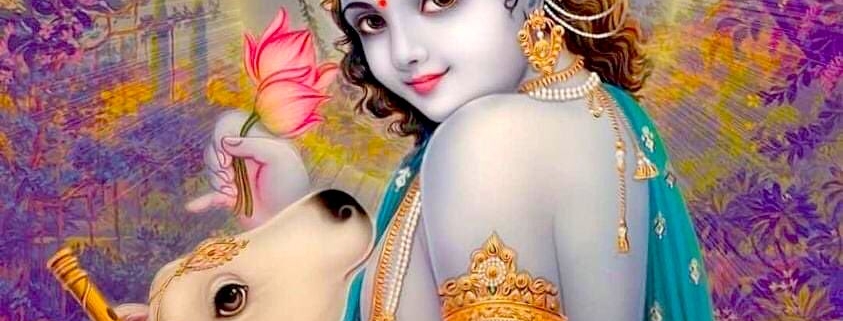
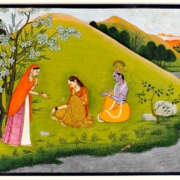
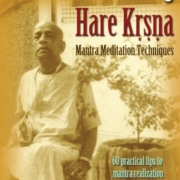
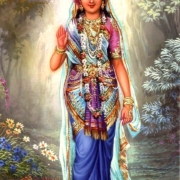

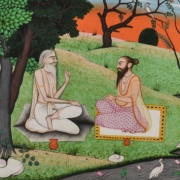


Trackbacks & Pingbacks
[…] to know more about karma? Please read our articles from serie “Karma Trilogy and Freedom” part one, part […]
Leave a Reply
Want to join the discussion?Feel free to contribute!